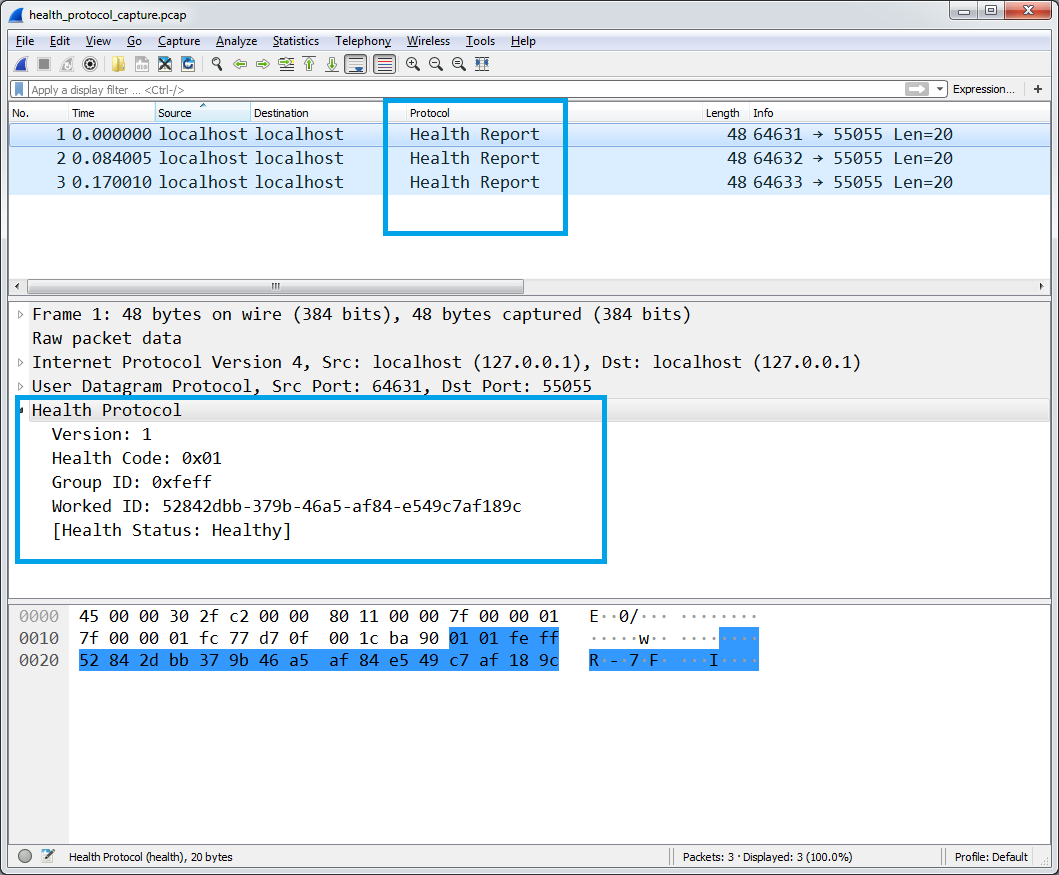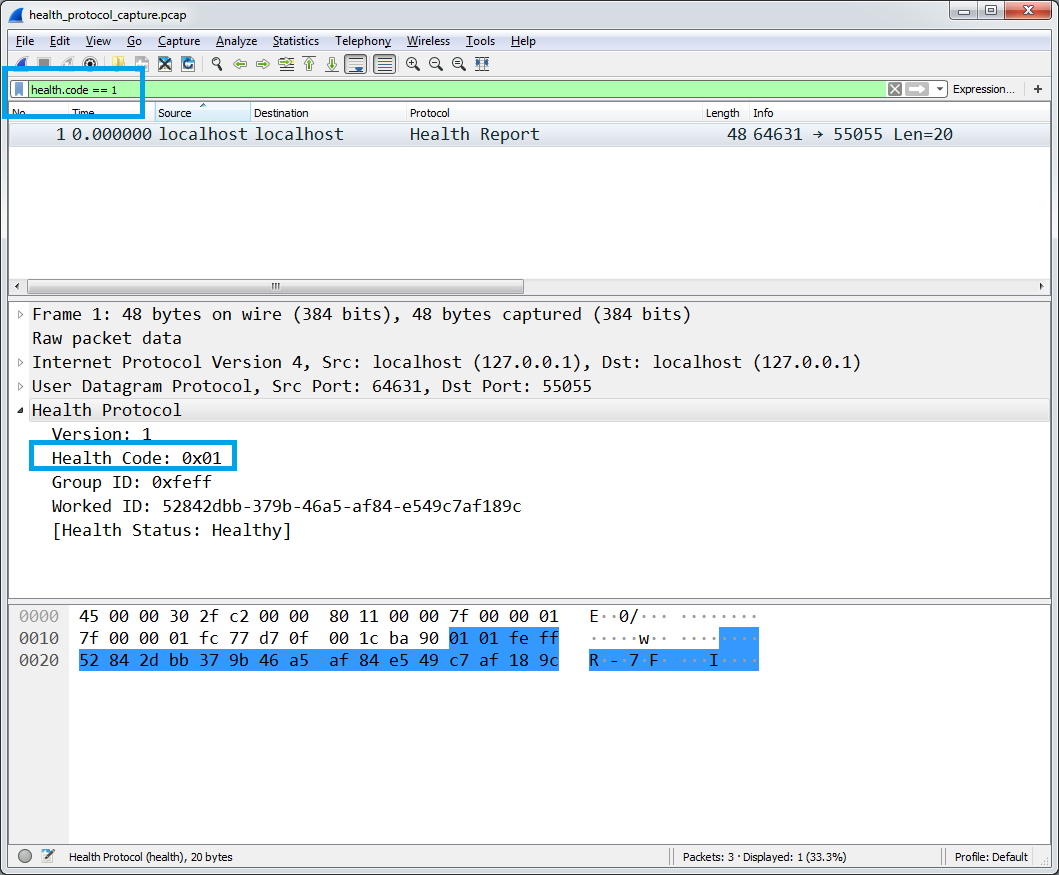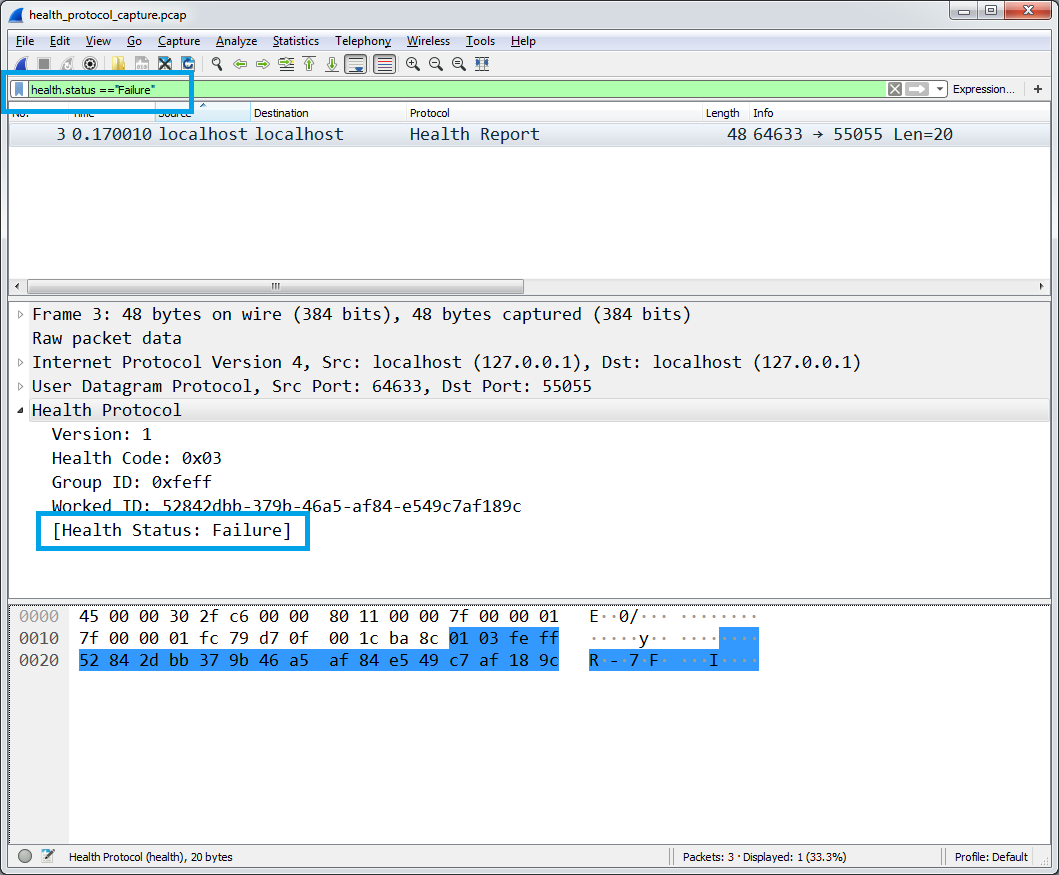Simple Wireshark Dissector for a Simple UDP Protocol
Wireshark Dissector for an UDP Protocol
In this post, we’ll explore building a simple UDP protocol dissector. Briefly, a dissector is used by Wireshark to identify a protocol’s fields in the packets, as well as display, and filter information about packets (e.g. a DNS dissector will identify the URL queried, the TTL, etc.)
I’ve found a good amount of API documentation and more advanced tutorials but nothing covering the basics like I would have liked when I recently had to build an UDP protocol dissector myself.
This custom dissector will be in written in Lua; dissectors can be written in C++ if performance is needed.
If you want to set yourself up to write the dissector, see Setting Up for Dissector Writing.
UDP Protocol
We’re going to invent ourselves a simple UDP protocol to then build a simple dissector around it.
Let’s imagine an UDP protocol for worker nodes reporting their health to a controller node.
Health Report Protocol
0 1 2 3
0 1 2 3 4 5 6 7 8 9 0 1 2 3 4 5 6 7 8 9 0 1 2 3 4 5 6 7 8 9 0 1
+-+-+-+-+-+-+-+-+-+-+-+-+-+-+-+-+-+-+-+-+-+-+-+-+-+-+-+-+-+-+-+-+
|Version(8 bits)| Health(8 bits)| GroupID(16 bits) |
+-+-+-+-+-+-+-+-+-+-+-+-+-+-+-+-+-+-+-+-+-+-+-+-+-+-+-+-+-+-+-+-+
| |
+ +
| |
+ WorkerUUID(128 bits) +
| |
+ +
| |
+-+-+-+-+-+-+-+-+-+-+-+-+-+-+-+-+-+-+-+-+-+-+-+-+-+-+-+-+-+-+-+-+
We have 4 fields in our protocol:
- Version (8-bit unsigned int), expected versions of the protocol (we have only 1 version for now):
- Version 1: 0x01
- Health code (8-bit unsigned int), 3 health codes in our version:
- Healthy State: 0x01
- High Load State: 0x02
- Failure State: 0x03
- GroupID (16-bit unsigned int), the group that the worker is part of
- WorkerdUUID (128-bit UUID)
Dissector
Our dissector will be a Lua file that Wireshark will load and use to parse our UDP packet.
Registering Our Protocol on UDP Port 55055
In our Lua file:
--we create our new protocol
local proto_health = Proto.new("health", "Health Protocol")
-- the `dissector()` method is called by Wireshark when parsing our packets
function proto_health.dissector(buffer, pinfo, tree)
end
--we register our protocol on UDP port 55055
udp_table = DissectorTable.get("udp.port"):add(55055, proto_health)
Declaring Our Protocol Fields
We first declare our field types and size for the fields in the protocol we invented.
There are
- (normal) fields: they map to the packet bytes.
- generated fields: they are derived information from the packet we wish to display in the tree (e.g. the human-readable meaning of a code) and make searchable in the display filter.
local proto_health = Proto.new("health", "Health Protocol")
--- --- Our Fields --- ---
-- These are the fields defined in our protocol
-- They will also be searchable in the display filter
-- for `field_version`:
-- type/size of this field (here uint8, a byte).
-- "health.version" to be used in the display filter to query/search/narrow down a
-- list of packets (e.g. health.version == 1)
-- "Version" is the display name/field label shown when drilling down in a packet
-- `base.DEC` is the representation of the uint8 (we could have used base.HEX)
local field_version = ProtoField.uint8("health.version", "Version", base.DEC)
local field_health = ProtoField.uint8("health.code", "Health Code", base.HEX)
local field_groupid = ProtoField.uint16("health.group", "Group ID", base.HEX)
-- guid field has its own representation
local field_workerguid = ProtoField.guid("health.guid", "Worked ID")
--- Our Generated Fields ---
-- Generated fields are fields derived from information found in the packet
-- In this case, we want to display a string representation of the health code
generated_health_name = ProtoField.string("health.status", "Health Status")
-- we attach all fields (normal and generated) to our protocol
proto_health.fields = {field_version, field_health, field_groupid,
field_workerguid, generated_health_name}
function proto_health.dissector(buffer, pinfo, tree)
end
udp_table = DissectorTable.get("udp.port"):add(55055, proto_health)
Dissecting the Protocol
local proto_health = Proto.new("health", "Health Protocol")
local field_version = ProtoField.uint8("health.version", "Version", base.DEC)
local field_health = ProtoField.uint8("health.code", "Health Code", base.HEX)
local field_groupid = ProtoField.uint16("health.group", "Group ID", base.HEX)
local field_workerguid = ProtoField.guid("health.guid", "Worked ID")
generated_health_name = ProtoField.string("health.status", "Health Status")
proto_health.fields = {field_version, field_health, field_groupid,
field_workerguid, generated_health_name}
-- the `dissector()` method is called by Wireshark when parsing our packets
-- `buffer` holds the UDP payload, all the bytes from our protocol
-- `tree` is the structure we see when inspecting/dissecting one particular packet
function proto_health.dissector(buffer, pinfo, tree)
-- Changing the value in the protocol column (the Wireshark pane that displays
-- a list of packets)
pinfo.cols.protocol = "Health Report"
-- We label the entire UDP payload as being associated with our protocol
local payload_tree = tree:add( proto_health, buffer() )
-- For the `version` field, we have:
-- the position of the first byte (which is 0 here because `version` byte
-- is the first one in the protocol)
-- how long (in bytes) this field is (1 in our case)
local version_pos = 0
local version_len = 1
-- `version_buffer` holds the range of bytes
local version_buffer = buffer(version_pos,version_len)
-- with `add()`, we're associating the range of bytes from `buffer`
-- with our field we declared earlier
-- this means:
-- (1) the values is now searchable in the display filter
-- (e.g.we can filter a list of packets with health.version == 1)
-- (2) Wireshark will create an entry in the packet inspection tree,
-- highlight which part of the packet we're referencing
-- and show a label with our field name and value
payload_tree:add(field_version, version_buffer)
local health_pos = version_pos + version_len
local health_len = 1
local health_buffer = buffer(health_pos,health_len)
payload_tree:add(field_health, health_buffer)
local groupid_pos = health_pos + health_len
local groupid_len = 2
local groupid_buffer = buffer(groupid_pos, groupid_len)
payload_tree:add(field_groupid, groupid_buffer)
local workerguid_pos = groupid_pos + groupid_len
local workerguid_len = 16
local workerguid_buffer = buffer(workerguid_pos,workerguid_len)
payload_tree:add(field_workerguid, workerguid_buffer)
-- We build our health code <-> health status table
local health_code_table = {}
health_code_table[1] = "Healthy"
health_code_table[2] = "High Load"
health_code_table[3] = "Failure"
-- we remember that `health_buffer` holds a byte range, we interpret this as a uint
local health_code = health_buffer:uint()
-- we fetch the string from our table
local health_string = health_code_table[health_code]
-- we associate this string as the value for our generated field
-- it'll also be searchable in the display filter
-- and also appear in the inspection/dissection tree
-- set_generated() adds square brackets around the field to mark it as generated
payload_tree:add(generated_health_name, health_string):set_generated()
end
udp_table = DissectorTable.get("udp.port"):add(55055, proto_health)
Results
We see Wireshark shows us our the our fields, and protocol name:

We can filter packets by field value:

We can also filter packets generated field value:

Capture File of Our Protocol
Here’s the capture file of 3 packets from our Health Report protocol.